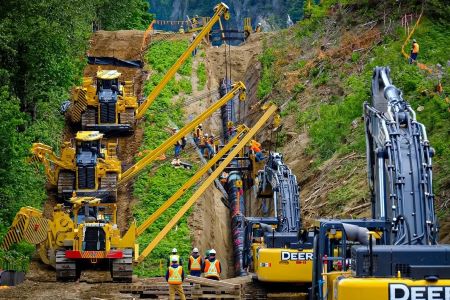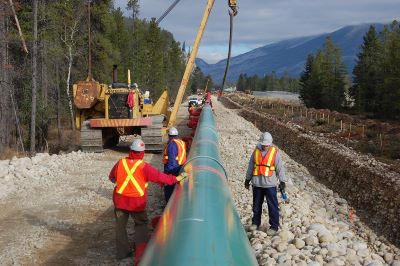Canada needs to fast-track key energy projects, secure new markets in wake of U.S. tariffs: Business Council of Canada
 Canada must take immediate steps to prioritize and fast-track key projects in energy, transportation and digital infrastructure to ensure continued economic stability in the face of U.S. tariffs, says a new report by the Business Council of Canada (BCC).
Canada must take immediate steps to prioritize and fast-track key projects in energy, transportation and digital infrastructure to ensure continued economic stability in the face of U.S. tariffs, says a new report by the Business Council of Canada (BCC).
Canada’s energy sector must expand rapidly to secure long-term energy independence and new markets, the report says.
“Continued uncertainty around the details and timing of potential tariffs will dissuade people from investing money in Canada,” the BCC warns.
“Few businesses, foreign or domestic, will put their money in a country that remains so heavily dependent on preferential access to a single dominant and unpredictable customer. Businesses will suffer, jobs will decline and living standards for all Canadians will go down.”
For far too long, Canadians have lacked ambition and a long-term vision for our prosperity, instead being content with our status as neighbours of the world’s largest economy, the BCC says. “We can no longer afford that level of comfort and complacency.”
The report, Ambition and Action: An urgent plan for Canada, presents a two-part action plan, one part focused on strategic industrial growth and the other on an energy and critical minerals strategy.
The objective of the strategic industrial growth plan is to strengthen domestic industries, accelerate investment and enhance productivity and resilience. The report recommends immediate funding through internal reallocation for essential infrastructure projects that support economic resilience, including energy, trade and research and development infrastructure such as industrial laboratories.
Expedite project approvals, harmonize regulations across all levels of government and eliminate bureaucratic bottlenecks that delay strategic investments, the BCC says.
To build a more competitive and innovative economy, Canada must prioritize R&D and commercialization in high-growth industries where Canada has a competitive advantage, the report says. A new targeted industrial R&D public-private effort should be deployed in strategic sectors:
- Advanced manufacturing – Invest in precision manufacturing, automation and AI-driven production to enhance global competitiveness.
- Ag-tech – Promote modernized food production and precision agriculture to increase efficiency and sustainability in farming.
- Cleantech – Focus on next-generation energy solutions, including advancements in nuclear and carbon capture technologies.
- Biotechnology – Accelerate growth in synthetic biology and agricultural biotech to strengthen Canada’s position in global innovation.
- Semiconductors and advanced materials – Develop capabilities in microchip production and new material sciences to enhance industrial sovereignty.
Canada’s defence industrial sector is crucial for national security and economic growth, the report says.
Bolstering the defence industry not only enhances sovereignty but also supports domestic technological innovation, according to the report. The federal government must take steps to:
- Develop a national defence industrial base strategy that enhances domestic production capabilities and strengthens international commitments.
- Streamline defence procurement to improve efficiency, support domestic suppliers and drive technological innovation in defence-related industries.
- Strengthen defence-related R&D to support aerospace, cybersecurity and advanced weaponry sectors, ensuring that Canada remains competitive globally.
To reduce reliance on U.S. supply chains and boost local economic activity, the report says Canada must implement a Canada-first procurement policy which should prioritize domestic manufacturing and suppliers in public contracts to strengthen local industries.
Federal and provincial/territorial procurement programs should be expanded to ensure Canadian companies receive preference in government projects, the report recommends.
To stimulate immediate business investment, Canada should:
- Implement a five-year, 100-percent capital cost allowance for businesses making strategic investments in domestic production.
- Partner with the private sector to ensure talent development in AI, advanced manufacturing and other high-growth fields, thereby strengthening Canada’s industrial competitiveness.
The Canadian economy has been constrained by internal barriers to trade and labour mobility, which essentially act as domestic tariffs, the report notes.
The negative impact that these barriers have on our economic competitiveness, productivity and growth is as great if not greater than the impact of the threatened tariffs on Canadian exports to the U.S. “They must be eliminated, completely and immediately.”
Expand energy production, enhance energy independence
The second component of the BCC’s plan is an energy and critical minerals strategy. Its objective is to expand energy production, secure new markets and enhance national energy independence.
Canada’s energy sector must expand rapidly to secure long-term energy independence and new markets, the report says. The federal government should:
- Expedite approvals for energy and critical mineral projects.
- Expand domestic refining and processing of critical minerals essential for advanced materials, batteries, military and clean energy technologies.
- Streamline project approval and permitting processes for major projects by advancing the principle of “one project, one assessment, one decision.”
- Ensure efficient and predictable operations of Canada’s port and railroad systems.
To expand the capacity to export energy and critical mineral resources, Canada should:
- Develop new export opportunities to support the long-term energy security goals of our allies and trading partners.
- Prioritize new pipeline development, LNG terminals and port capacity to facilitate competitive energy exports.
- Partner with provincial/territorial governments and Indigenous communities to ensure jurisdictional harmony, public support and shared benefits through additional export opportunities.
- Expand partnerships with private sector firms to drive innovation and create high-value jobs in the nuclear sector.
- Accelerate commercial-scale deployment of proven and innovative nuclear technologies, including both large and small modular reactors, to establish Canada as a global leader in next-generation nuclear energy.
- Ensure a robust and responsive nuclear regulatory system that supports the development and application of new technologies while maintaining public confidence.
- Develop export markets for Canadian uranium, nuclear fuel, equipment, technology and services.
Concludes the report: “The potential imposition of U.S. tariffs on key Canadian exports poses a significant economic challenge, but it also presents an opportunity to strengthen Canada’s industrial base and enhance energy security for generations to come.”
In accelerating new pipeline development, Canada could consider implementing targeted regulatory reforms to expedite approvals, minimizing unnecessary bureaucratic and consultative hurdles, according to a commentary from the C.D. Howe Institute.
“If conventional measures are insufficient, the government could explore declaring a national emergency and invoking the exceptional powers granted to it under the Peace Order and Good Government clause of the constitution. It could also consider invoking the Notwithstanding clause if necessary,” the commentary says.
It was written by Dwight Duncan, senior fellow at the C.D. Howe Institute; John Manley, senior business advisor at Bennett Jones LLP; and Duncan Munn, CEO of the Elevate Group.
Canada also could offer first-loss capital to attract private sector investment in pipeline development, they said. First-loss capital essentially is government-backed insurance on the first portion of potential losses.
“Canada is at a critical crossroads,” they said. Accelerating progress in pipeline infrastructure “is not only an energy issue but one of national security, economic growth and long-term resilience.”
More Canadians’ support economic growth in deciding energy policy, fewer concerned about environmental impacts
The return of U.S. President Donald Trump to the White House and his threat of widespread tariffs have seismically shifted the economic landscape in Canada, according to a new poll by the non-profit Angus Reid Institute.
Trump’s tariffs also threaten to upend energy development in both the short-term and the long term.
“The threat of tariffs from Trump has no doubt altered the economic calculus in Canada,” the Vancouver-based institute said. “The free and close trading relationship between Canada and the United States, and the economic benefits it provided, can no longer be guaranteed.”
Earlier this month, the Angus Reid Institute reported that nine in 10 (91 percent) of Canadians believe their country needs to reduce its reliance on the U.S. as a trading partner in response to Trump’s tariffs.
The institute’s new data finds that Canadians’ priorities when it comes to energy policy may be shifting alongside these seismic waves.
More than two in five Canadians currently believe relying on domestic energy (46 percent) and creating economic growth (43 percent) should be the top priorities for the country’s energy policymakers.
In August 2023, only one-quarter (23 percent) of Canadians said this. The emphasis on creating economic growth has nearly doubled.
There has been a corresponding decline in the importance of environmental concerns in energy policy, which had been the top choice (44 percent) for Canadians in 2023.
Now, at 31 percent, these concerns fall behind decreasing reliance on international sources of energy (46 percent), economic growth (43 percent), investing in alternatives (38 percent) and bringing down the price of gasoline (34 percent).
While the balance between economic development and environmental protection appears to have shifted, renewable energy sources are still much more popular across political and regional divides than hydrocarbons.
The further development of hydroelectric sources receives the highest support from Canadians (88 percent), followed by solar (77 percent), wind (72 percent) and nuclear power (63 percent).
Natural gas (61 percent) and crude oil (51 percent) receive less, but still majority support.
A majority of Canadians in every region give a thumbs-up to further expansion of the three renewables (solar, wind and hydro).
One analysis in 2013 found there was enough potential wind power in Canada, distributed in enough regions of the country, to replace current electricity usage, without accounting for potential storage.
Another study found that just by installing solar panels on viable rooftops, Canada could generate a quarter of the country’s electricity.
Solar capacity increased nearly 25,000 percent between 2007 and 2022, while wind power increased more than 800 per cent in the same period.
However, in 2022, solar (one percent) and wind (six percent) accounted for just a small percentage of Canada’s electricity generation, far outstripped by hydro (62 percent), fossil fuels (17 percent) and nuclear (13 percent).
Nuclear is now supported by a majority in all regions except Quebec, where fewer than two-in-five (36 percent) believe further nuclear power should be developed.
After the Fukushima nuclear disaster in Japan in 2011, Quebec decommissioned its only nuclear power plant, Gentilly-2, located northeast of Montreal in Bécancour.
Hydro-Québec, the government-run utility provider, had considered in 2023 reviving the plant, but was met with concerns from critics in the province after “the collective choice to get out of nuclear power in Quebec.”
More Key Findings:
- The Angus Reid Institute’s Energy Perspectives Index finds 18 percent of Canadians prefer to focus on hydrocarbon sources, while 33 percent lean that way. There are 19 percent who would prefer the focus to be entirely on renewable energy, while 30 percent lean that way.
- Support for the expansion of wind (72 percent) and solar (77 percent) is still high but has declined by five and seven points, respectively, from 2021.
- Meanwhile, support for more nuclear power has increased by 12 points from 2021 (51 percent to 63 percent) and is double the level seen in the 1980s and early 1990s.
Canadians’ support growing for new pipelines, including those previously rejected
Other new data from the Angus Reid Institute finds Canadians largely showing support for increasing pipeline capacity through two previously dismissed developments – the Energy East and Northern Gateway pipelines.
Each has significant economic and jurisdictional hurdles to overcome, but the public opinion landscape is evidently favourable.
Half of Canadians (49 percent) say the federal government is not doing enough to build pipeline capacity, the same number who said so in 2019.
Three in 10 (29 percent) say the Liberals have taken the right approach, while 22 percent say Justin Trudeau’s government has pushed the development of new pipelines too hard.
Two-thirds of Canadians say they would support the renewal of Energy East – a project terminated in 2017 – that would have carried oil from the west to New Brunswick and Quebec. Energy East would have filled the gap in pipeline capacity in shipping crude oil across Canada without first travelling through the U.S.
Quebec Premier Francois Legault recently stated that his government would consider the Energy East project if it became appealing to Quebecers. Support for Energy East in Quebec has risen from 33 percent to 47 per cent since 2019.
Nationally support for Energy East has risen from 58 percent to 65 per cent. Across Canada, support for Energy East has risen compared with 2019 – except in Alberta, where support has declined from 88 percent to 76 percent.
Another project that frustrated both supporters and opponents in Canada is the Northern Gateway pipeline on the West Coast.
This project, too, was terminated several years ago, after the Liberal federal government imposed a moratorium on oil tanker traffic on British Columbia’s northern coastline near the proposed pipeline’s terminus.
A slight majority of Canadians say they would support this project as well, while one-quarter oppose it. Northern Gateway generates 55 percent support in B.C., with 32 percent opposition.
 Asked about another project – the Trans Mountain pipeline expansion (photo at right, Kinder Morgan Canada) – Canadians are divided on whether the government made the right decision (34 percent) or wrong decision (32 percent) in purchasing it for $4.5 billion from Kinder Morgan.
Asked about another project – the Trans Mountain pipeline expansion (photo at right, Kinder Morgan Canada) – Canadians are divided on whether the government made the right decision (34 percent) or wrong decision (32 percent) in purchasing it for $4.5 billion from Kinder Morgan.
Cost overruns and delays beset the pipeline expansion, ballooning the cost to $34 billion. More than half (56 percent) say that ultimately the pipeline will be good for Canada.
Two-thirds of Canadians (66 percent) say that federal regulations make pipeline projects more expensive than they should be. One-in-five (19 percent) are unsure and 16 percent disagree.
Canada is a net exporter of crude oil, with almost all of it going to the U.S. But Canada also is a net importer of gasoline, most of it coming from the U.S., the Angus Reid Institute says.
“This situation gets sticky in the event of tariffs on either side of the border, which could damage Canada’s oil and gas producers, such as Alberta, and potentially harm consumers of American gasoline throughout the country.”
R$
Events For Leaders in
Science, Tech, Innovation, and Policy
Discuss and learn from those in the know at our virtual and in-person events.
See Upcoming Events
You have 0 free articles remaining.
Don't miss out - start your free trial today.
Start your FREE trial Already a member? Log in
By using this website, you agree to our use of cookies. We use cookies to provide you with a great experience and to help our website run effectively in accordance with our Privacy Policy and Terms of Service.




